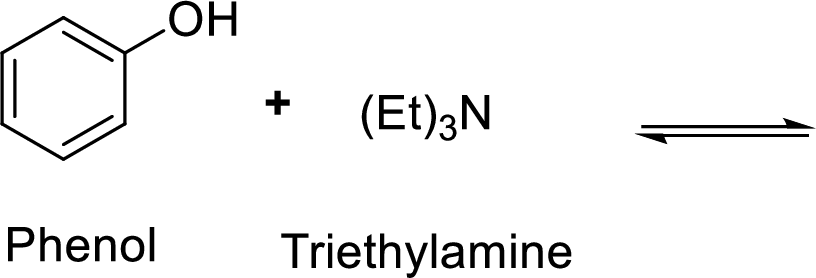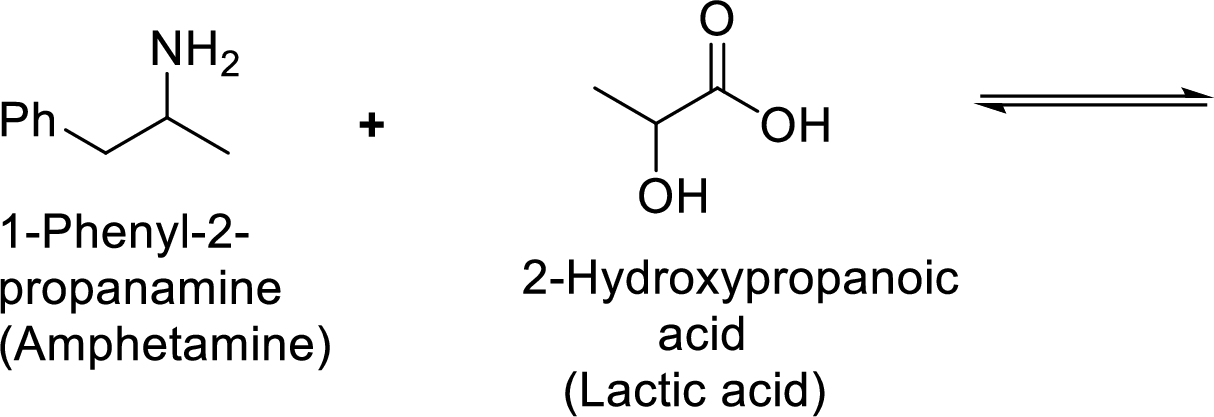
(a)
Interpretation:
Given acid-base reaction has to be completed and the direction of equilibrium has to be predicted.
Concept introduction:
According to the explanations by Bronsted-Lowry, if a species loses a proton then it is an acid whereas if a species receives one proton, then it is base.
If a base receives one proton, then the formed species is a conjugate acid whereas an acid lose one proton, then the formed species is a conjugated base.
Mixture of acid and base undergoes equilibrium reaction and it’s
Weak acids are more stable and less reactive, so equilibrium follows the direction of formation weak acids in a reaction.
Lesser the
(a)
Explanation of Solution
Given reaction is shown below,

According to the explanations by Bronsted-Lowry, if a species loses a proton then it is an acid whereas if a species receives one proton, then it is base. If a base receives one proton, then the formed species is a conjugate acid whereas an acid lose one proton, then the formed species is a conjugated base.

Weak acid is more stable, equilibrium follows the direction of formation weak acids in a reaction. Long arrow indicates the direction where equilibrium favors.
Here, acetate anion is the weaker acid and equilibrium lies towards the right.
(b)
Interpretation:
Given acid-base reaction has to be completed and the direction of equilibrium has to be predicted.
Concept introduction:
According to the explanations by Bronsted-Lowry, if a species loses a proton then it is an acid whereas if a species receives one proton, then it is base.
If a base receives one proton, then the formed species is a conjugate acid whereas an acid lose one proton, then the formed species is a conjugated base.
Mixture of acid and base undergoes equilibrium reaction and it’s
Weak acids are more stable and less reactive, so equilibrium follows the direction of formation weak acids in a reaction.
Lesser the
(b)
Explanation of Solution
Given reaction is shown below,

According to the explanations by Bronsted-Lowry, if a species loses a proton then it is an acid whereas if a species receives one proton, then it is base. If a base receives one proton, then the formed species is a conjugate acid whereas an acid lose one proton, then the formed species is a conjugated base.

Weak acid is more stable, equilibrium follows the direction of formation weak acids in a reaction. Long arrow indicates the direction where equilibrium favors.
Here, triethylammonium cation is the weaker acid and equilibrium lies towards the right.
(c)
Interpretation:
Given acid-base reaction has to be completed and the direction of equilibrium has to be predicted.
Concept introduction:
According to the explanations by Bronsted-Lowry, if a species loses a proton then it is an acid whereas if a species receives one proton, then it is base.
If a base receives one proton, then the formed species is a conjugate acid whereas an acid lose one proton, then the formed species is a conjugated base.
Mixture of acid and base undergoes equilibrium reaction and it’s
Weak acids are more stable and less reactive, so equilibrium follows the direction of formation weak acids in a reaction.
Lesser the
(c)
Explanation of Solution
Given reaction is shown below,
According to the explanations by Bronsted-Lowry, if a species loses a proton then it is an acid whereas if a species receives one proton, then it is base. If a base receives one proton, then the formed species is a conjugate acid whereas an acid lose one proton, then the formed species is a conjugated base.
Weak acid is more stable, equilibrium follows the direction of formation weak acids in a reaction. Long arrow indicates the direction where equilibrium favors.
Here, phenyl acetylene is the weaker acid and equilibrium lies towards the left.
(d)
Interpretation:
Given acid-base reaction has to be completed and the direction of equilibrium has to be predicted.
Concept introduction:
According to the explanations by Bronsted-Lowry, if a species loses a proton then it is an acid whereas if a species receives one proton, then it is base.
If a base receives one proton, then the formed species is a conjugate acid whereas an acid lose one proton, then the formed species is a conjugated base.
Mixture of acid and base undergoes equilibrium reaction and it’s
Weak acids are more stable and less reactive, so equilibrium follows the direction of formation weak acids in a reaction.
Lesser the
(d)
Explanation of Solution
Given reaction is shown below,
According to the explanations by Bronsted-Lowry, if a species loses a proton then it is an acid whereas if a species receives one proton, then it is base. If a base receives one proton, then the formed species is a conjugate acid whereas an acid lose one proton, then the formed species is a conjugated base.
Weak acid is more stable, equilibrium follows the direction of formation weak acids in a reaction. Long arrow indicates the direction where equilibrium favors.
Here,
(e)
Interpretation:
Given acid-base reaction has to be completed and the direction of equilibrium has to be predicted.
Concept introduction:
According to the explanations by Bronsted-Lowry, if a species loses a proton then it is an acid whereas if a species receives one proton, then it is base.
If a base receives one proton, then the formed species is a conjugate acid whereas an acid lose one proton, then the formed species is a conjugated base.
Mixture of acid and base undergoes equilibrium reaction and it’s
Weak acids are more stable and less reactive, so equilibrium follows the direction of formation weak acids in a reaction.
Lesser the
(e)
Explanation of Solution
Given reaction is shown below,

According to the explanations by Bronsted-Lowry, if a species loses a proton then it is an acid whereas if a species receives one proton, then it is base. If a base receives one proton, then the formed species is a conjugate acid whereas an acid lose one proton, then the formed species is a conjugated base.

Weak acid is more stable, equilibrium follows the direction of formation weak acids in a reaction. Long arrow indicates the direction where equilibrium favors.
Here, triethylammonium chloride is the weaker acid and equilibrium lies towards the left.
(f)
Interpretation:
Given acid-base reaction has to be completed and the direction of equilibrium has to be predicted.
Concept introduction:
According to the explanations by Bronsted-Lowry, if a species loses a proton then it is an acid whereas if a species receives one proton, then it is base.
If a base receives one proton, then the formed species is a conjugate acid whereas an acid lose one proton, then the formed species is a conjugated base.
Mixture of acid and base undergoes equilibrium reaction and it’s
Weak acids are more stable and less reactive, so equilibrium follows the direction of formation weak acids in a reaction.
Lesser the
(f)
Explanation of Solution
Given reaction is shown below,

According to the explanations by Bronsted-Lowry, if a species loses a proton then it is an acid whereas if a species receives one proton, then it is base. If a base receives one proton, then the formed species is a conjugate acid whereas an acid lose one proton, then the formed species is a conjugated base.

Weak acid is more stable, equilibrium follows the direction of formation weak acids in a reaction. Long arrow indicates the direction where equilibrium favors.
Here, 1-phenyl-2-propanammonium ion is the weaker acid and equilibrium lies towards the right.
(g)
Interpretation:
Given acid-base reaction has to be completed and the direction of equilibrium has to be predicted.
Concept introduction:
According to the explanations by Bronsted-Lowry, if a species loses a proton then it is an acid whereas if a species receives one proton, then it is base.
If a base receives one proton, then the formed species is a conjugate acid whereas an acid lose one proton, then the formed species is a conjugated base.
Mixture of acid and base undergoes equilibrium reaction and it’s
Weak acids are more stable and less reactive, so equilibrium follows the direction of formation weak acids in a reaction.
Lesser the
(g)
Explanation of Solution
Given reaction is shown below,

According to the explanations by Bronsted-Lowry, if a species loses a proton then it is an acid whereas if a species receives one proton, then it is base. If a base receives one proton, then the formed species is a conjugate acid whereas an acid lose one proton, then the formed species is a conjugated base.

Weak acid is more stable, equilibrium follows the direction of formation weak acids in a reaction. Long arrow indicates the direction where equilibrium favors.
Here, amphetamine hydrochloride is the weaker acid and equilibrium lies towards the left.
(h)
Interpretation:
Given acid-base reaction has to be completed and the direction of equilibrium has to be predicted.
Concept introduction:
According to the explanations by Bronsted-Lowry, if a species loses a proton then it is an acid whereas if a species receives one proton, then it is base.
If a base receives one proton, then the formed species is a conjugate acid whereas an acid lose one proton, then the formed species is a conjugated base.
Mixture of acid and base undergoes equilibrium reaction and it’s
Weak acids are more stable and less reactive, so equilibrium follows the direction of formation weak acids in a reaction.
Lesser the
(h)
Explanation of Solution
Given reaction is shown below,

According to the explanations by Bronsted-Lowry, if a species loses a proton then it is an acid whereas if a species receives one proton, then it is base. If a base receives one proton, then the formed species is a conjugate acid whereas an acid lose one proton, then the formed species is a conjugated base.

Weak acid is more stable, equilibrium follows the direction of formation weak acids in a reaction. Long arrow indicates the direction where equilibrium favors.
Here, water is the weaker acid and equilibrium lies towards the right.
Want to see more full solutions like this?
Chapter 23 Solutions
Organic Chemistry, Loose-leaf Version
- (j) Discuss the stability of substance A in the presence of water and the expected reaction. 2. Consider the two substances below. མ ི་ལེབ་ Na+ i CH3 OH Page 2 of 5 OH Substance A Substance B (a) Will there be a reaction between the two substances? Yes/No. If yes, draw the structure of the product. (b) Which substance is the Lewis acid in this reaction? Provide a short explanation. (b) Which substance is the Lewis base in this reaction? Provide a short explanation. (d) Describe the type of reaction occurring between the two substances and provide the balanced chemical equation.arrow_forwardWrite the bond-line presentation of [(Et)2OH]+ Then, write the bond-line presentation of it's conjugate base.arrow_forwardConjugate base acid 1a. Consider the reaction AH(+) + H₂O →> A:(-) + H3O+). For the following named acids: a) draw the structure of the acid, b) give the approximate pKa of the conjugate acid in units of 5, c) give the name of the conjugate base, and d) draw the structure of the conjugate base. Dimethyl sulfoxide pKa Acrylic Acid pKa Ethyl Acetate pKa Benzamide pKaarrow_forward
- The benzylammonium ion (c6H5CH2NH3+) has pka=9.33 and the propylammonium ion has pka=10.71. Which is the stronger base, benzylamine or propylaminearrow_forwardcomplete the equation for the reaction between each Lewis acid-base pair. In each equation, label which starting material is the Lewis acid and which is the Lewis base; use curved arrows to show the flow of electrons in each reaction. In doing this problem, it is essential that you show valence electrons for all atoms participating in each reactionarrow_forwardConsider the two following nitrophenol structures: OH OH `NO2 NO2 p-nitrophenol m-nitrophenol Predict which will be the stronger acid. (Hint: Consider possible resonance structures analogous to those given in the text for phenol.)arrow_forward
- Dicarboxylic acids have two dissociation constants, one for the initial dissociation into a rnonoanion and one for the second dissociation into a dianion . For oxalic acid, HO,C-CO,H, the first ionization constant has pKaj = 1.2 and the second ionization constant has pKaz = 4.2. Why is the second carboxyl group so much less acidic than the first?arrow_forward4. The pk, of vanillin is about 9, which is much more acidic than a normal alcohol. Draw a reaction showing the deprotonation of vanillin with NaOH, and then draw six resonance structures of the conjugate base. Draw the hybrid structure and clearly indicate how the negative charge is distributed in the compound.arrow_forwardRank the Acidity of the following sets of compounds. Give an explanation for the answers.arrow_forward
- The CH3- ion is the conjugate base of CH4, and CH4 shows no evidence of being an acid in water. Write a balanced equation for the reaction of CH3- and water.arrow_forwardHow did you know the molecules were weak or strong acid? Please give the pKa if that's the method you used. Please explain in detail.arrow_forwardThe antimalaria properties of quinine (C20H24N202) saved thousands of lives during construction of the Panama Canal. This substance is a classic example of the medicinal wealth that tropical forests hold. Both N atoms are basic, and the N of the amine group is far more basic (pKb=4.94) than the N within the aromatic ring system (pKb=10.54). A saturated solution of quinine in water is only 4.55x10-3M. What is the pH of this solution? Record your answer with 2 decimals.arrow_forward
 Organic ChemistryChemistryISBN:9781305580350Author:William H. Brown, Brent L. Iverson, Eric Anslyn, Christopher S. FootePublisher:Cengage Learning
Organic ChemistryChemistryISBN:9781305580350Author:William H. Brown, Brent L. Iverson, Eric Anslyn, Christopher S. FootePublisher:Cengage Learning Introduction to General, Organic and BiochemistryChemistryISBN:9781285869759Author:Frederick A. Bettelheim, William H. Brown, Mary K. Campbell, Shawn O. Farrell, Omar TorresPublisher:Cengage Learning
Introduction to General, Organic and BiochemistryChemistryISBN:9781285869759Author:Frederick A. Bettelheim, William H. Brown, Mary K. Campbell, Shawn O. Farrell, Omar TorresPublisher:Cengage Learning Chemistry: The Molecular ScienceChemistryISBN:9781285199047Author:John W. Moore, Conrad L. StanitskiPublisher:Cengage Learning
Chemistry: The Molecular ScienceChemistryISBN:9781285199047Author:John W. Moore, Conrad L. StanitskiPublisher:Cengage Learning



